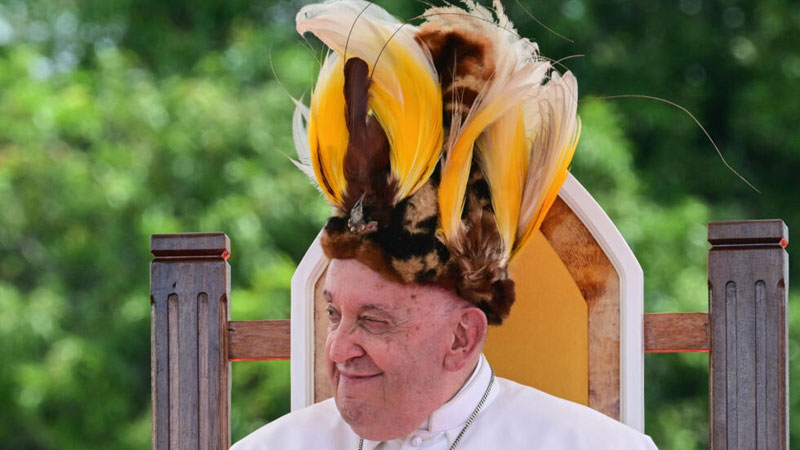 Pope Francis wrapped up an arduous 12-day tour of the Asia-Pacific on Friday, defying health concerns to connect with believers from the jungle of Papua New Guinea to the skyscrapers of Singapore.
Pope Francis wrapped up an arduous 12-day tour of the Asia-Pacific on Friday, defying health concerns to connect with believers from the jungle of Papua New Guinea to the skyscrapers of Singapore.
The 87-year-old pontiff took off for Rome, completing his longest trip in duration and distance since he became head of the world’s estimated 1.4 billion Roman Catholics more than 13 years ago.
The Argentine pope has relied on a wheelchair since 2022 because of knee pain and sciatica, had a hernia operation in June 2023, and earlier this year battled flu and bronchitis.
Occasionally, during his four-nation trip, the pope struggled to keep his eyes open when listening to late-night liturgical readings or to remain engaged during formal military parades.
But he was clearly energised by more freewheeling exchanges — cheerfully goading young people to shout out their agreement with his calls to help those in need.
In a lively final inter-religious meeting with young Singaporeans, the pope urged them to respect other beliefs, avoid being “slaves” to technology and to get out of their comfort zones.
“Don’t let your stomach get fat, but let your head get fat,” the pope said, raising a laugh from his audience.
“I say take risks, go out there,” he said. “A young person that is afraid and does not take risks is an old person.”
The historic tour, initially planned for 2020 but postponed by the Covid-19 pandemic, has included 43 hours of flight time and a distance of 32,000 kilometres (almost 20,000 miles).
‘Superstition and magic’: But neither the pace — 16 speeches and up to eight hours of time difference — nor the heat, nor multiple meetings have forced any rescheduling of his international odyssey.
On a trip that took him to the outer edges of the Church’s world, the pope delivered a sometimes uncomfortable message for leaders not to forget the poor and marginalised.
In Indonesia, the world’s most populous Muslim-majority state, he visited the capital Istiqlal Mosque to deliver a joint message against conflict and climate change.
In sweltering Papua New Guinea, he donned a Bird of Paradise headdress in a remote, jungle village where he told inhabitants to halt violence and renounce “superstition and magic”. Addressing political and business leaders, he insisted that the country’s vast natural resources should benefit the “entire community” — a demand likely to resound in a nation where many believe their riches are being stolen or squandered.
And in staunchly Roman Catholic East Timor, he addressed nearly half the population, drawing about 600,000 rapturous believers in the tropical heat to a celebration of mass on the island’s coast.
Francis addressed East Timor’s leaders, hailing a new era of “peace” since independence in 2002.
‘Deeply touched’: But he also called on them to do more to prevent abuse against young people, in a nod to recent Catholic Church child abuse scandals.
In the affluent city-state of Singapore, the pope called for “special attention” to be paid to protecting the dignity of migrant workers. “These workers contribute a great deal to society and should be guaranteed a fair wage,” he said.
There are an estimated 170 million migrant workers around the world. Most live in the Americas, Europe or Central Asia. But the Argentine pope was otherwise full of praise for the “entrepreneurial spirit” and dynamism that built a “mass of ultra-modern skyscrapers that seem to rise from the sea” in his final destination.